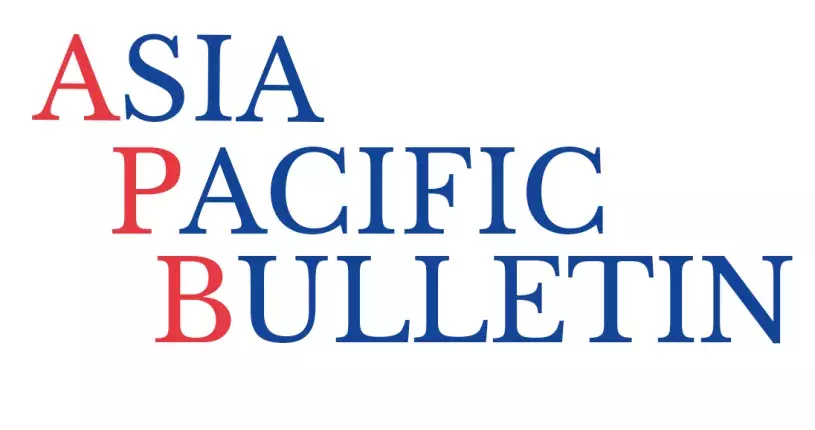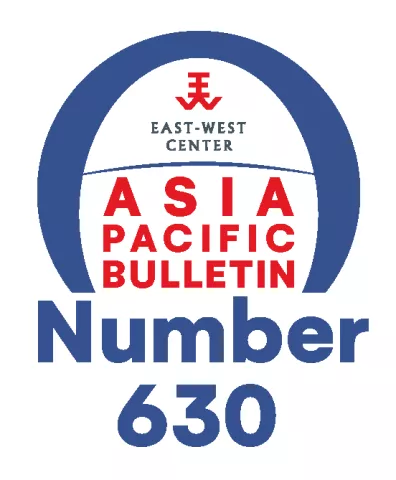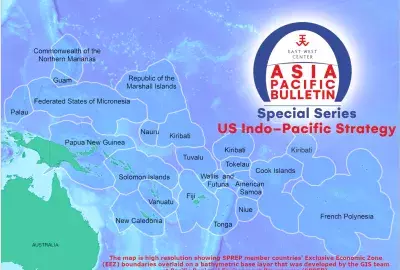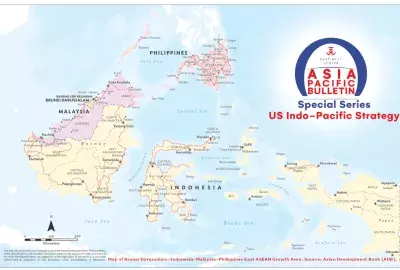Error message


| Alastair Morgan, Tokyo College Ushioda Fellow of the University of Tokyo and Visiting Senior Research Fellow of King's College London, summarizes the course of the United Kingdom's engagement with North Korea, from the Post-WWII era through the Covid-19 pandemic. |
| for additional titles in the Asia Pacific Bulletin |
| This article is a part of the North Korea in the World Special Series, a joint project between the National Committee on North Korea and the East-West Center that examines North Korea's external relations. |
As one of the Allied Powers, The United Kingdom was involved in Post-World War II planning for the Korean peninsula, including the November 1943 Cairo Conference declaration that “… in due course, Korea shall become free and independent.” However, US President Roosevelt’s proposal at the February 1945 Yalta Conference did not establish a formal role for the UK in the trusteeship of Korea. Subsequently, the United States and the Soviet Union agreed to divide the peninsula at the 38th parallel in August 1945, and direct British involvement in the peninsula was limited prior to the Korean War.
The United Kingdom’s Korean War contribution to the United Nations Command was second only to the United States, with significant deployments of maritime and air assets in addition to the provision of ground troops. Almost 60,000 British troops saw action, with nearly 5,000 killed, wounded, missing in action, or taken prisoner. Following the armistice, the United Kingdom has continued to send representation to the United Nations Command. The armistice agreement includes an obligation on so-called “Sending States” to respond to renewed hostility. Although there is no automatic UK commitment to send forces, the armistice agreement remains a consideration in engagement with North Korea.
The United Kingdom recognized the Democratic People's Republic of Korea (DPRK) as a state when the DPRK entered the United Nations in 1991 alongside the Republic of Korea. In the same year, the DPRK established a mission to the International Maritime Organization in London. However, the United Kingdom did not open an embassy in Pyongyang until 2000 in response to the Republic of Korea’s sunshine policy and warming inter-Korean relations. Dr. James “Jim” Hoare served as the first Chargé D’Affaires of the British Embassy in Pyongyang in 2001. The DPRK opened its Embassy in London at the same time. The opening of the embassy was followed by Ambassadorial level relations in 2002. One of Jim’s successors as Ambassador, John Everard, has described the embassy’s role and work in his book, Only Beautiful, Please – A British Diplomat in North Korea. In addition to reporting to the British government on DPRK affairs, the Ambassador in Pyongyang is tasked with conveying directly to DPRK government officials the views of the British government, particularly British concerns over the DPRK’s nuclear and ballistic missile programs and human rights issues.
For most of the period following the establishment of the embassy, the United Kingdom adopted and contributed to the EU policy of ‘critical engagement’ with the DPRK. The most significant engagement program within the DPRK was a teacher-training program managed by the British Council for seventeen years from 2000. British teachers employed by the Council taught future DPRK teachers in various universities in Pyongyang, using the English language and employing British teaching materials and techniques, including the encouragement of critical thinking. The program could be said to have opened windows on the world for the hundreds of DPRK participants. British Embassy staff encountered alumni from the program in different roles and locations around the country. The program may also have had a broader influence on DPRK pedagogy.
Through the issuance of small grants from the embassy, the British government supported in-country humanitarian projects, mainly health and welfare projects delivered by UN agencies or foreign non-government organizations permitted to operate in the DPRK. The British government was also a significant indirect donor as a core funder of NGOs and UN bodies such as the World Health Organization, UNICEF, and the UN’s Central Emergency Relief Fund. The British Red Cross also independently made substantial donations to DPRK Red Cross, which the latter assumed to have received official British approval.
The British Council English Teaching Program ended in 2017 because (at a time of increased tension resulting from DPRK nuclear tests and missile launches) the British Council and the Foreign Office feared that British teachers, who were not on diplomatic passports, might be unable to leave the DPRK in an emergency. At around the same time, the British Government decided to stop providing development assistance through the embassy for small-scale humanitarian programs. Embassy staff conducted contingency planning for closure in 2017, but fortunately, this did not prove to be necessary. The BBC World Service, which launched Korean language programming in November 2016, continued its Korean-language broadcast from outside the country, and indeed still does so.
When, in response to the outbreak of Covid-19 in China, the DPRK closed its borders in January 2020, the British Embassy remained open for some months. But the continuing inability to rotate staff led to its closure on 27 May 2020 and the departure of the remaining British diplomats. The embassy remains closed. It has been said that the policy of the British Government is to reopen the embassy when the circumstances allow. Conditions for this eventuality are likely to include the DPRK’s reopening of its borders for entry as well as exit of diplomats, the easing of restrictions on transit through China, and a determination by the British Government that it is safe to reopen. British diplomats have at times made public their wish to return to Pyongyang, and it is assumed that when they do so, the Embassy will eventually resume the range of activities it conducted before 2017. As of December 2022, however, there is nothing to indicate when the conditions for reopening might be met. The DPRK’s Embassy in London has not closed and can serve as a limited communication channel between governments.
The United Kingdom plays an active role in DPRK issues at the United Nations, particularly as a permanent member of the Security Council but also in the General Assembly and the Human Rights Council. The British Government’s 2021 Integrated Review of Security, Defense, Development, and Foreign Policy identified opportunism by the DPRK as among the key factors in the deterioration of the global security environment and the weakening of the international order. The Integrated Review includes the commitment that the United Kingdom will remain the most engaged non-regional partner on denuclearization and sanctions enforcement. Royal Navy vessels conduct operations in the East China Sea to uphold the UN sanctions against illicit DPRK programs.
In addition to implementing UN and some autonomous sanctions relating to the DPRK’s nuclear and ballistic missile programs, the United Kingdom also adopted its first Magnitsky-style sanctions against DPRK entities involved in human rights violations in 2020.

| Alastair Morgan, Tokyo College Ushioda Fellow of the University of Tokyo and Visiting Senior Research Fellow of King's College London, summarizes the course of the United Kingdom's engagement with North Korea, from the Post-WWII era through the Covid-19 pandemic. |
| for additional titles in the Asia Pacific Bulletin |
| This article is a part of the North Korea in the World Special Series, a joint project between the National Committee on North Korea and the East-West Center that examines North Korea's external relations. |
As one of the Allied Powers, The United Kingdom was involved in Post-World War II planning for the Korean peninsula, including the November 1943 Cairo Conference declaration that “… in due course, Korea shall become free and independent.” However, US President Roosevelt’s proposal at the February 1945 Yalta Conference did not establish a formal role for the UK in the trusteeship of Korea. Subsequently, the United States and the Soviet Union agreed to divide the peninsula at the 38th parallel in August 1945, and direct British involvement in the peninsula was limited prior to the Korean War.
The United Kingdom’s Korean War contribution to the United Nations Command was second only to the United States, with significant deployments of maritime and air assets in addition to the provision of ground troops. Almost 60,000 British troops saw action, with nearly 5,000 killed, wounded, missing in action, or taken prisoner. Following the armistice, the United Kingdom has continued to send representation to the United Nations Command. The armistice agreement includes an obligation on so-called “Sending States” to respond to renewed hostility. Although there is no automatic UK commitment to send forces, the armistice agreement remains a consideration in engagement with North Korea.
The United Kingdom recognized the Democratic People's Republic of Korea (DPRK) as a state when the DPRK entered the United Nations in 1991 alongside the Republic of Korea. In the same year, the DPRK established a mission to the International Maritime Organization in London. However, the United Kingdom did not open an embassy in Pyongyang until 2000 in response to the Republic of Korea’s sunshine policy and warming inter-Korean relations. Dr. James “Jim” Hoare served as the first Chargé D’Affaires of the British Embassy in Pyongyang in 2001. The DPRK opened its Embassy in London at the same time. The opening of the embassy was followed by Ambassadorial level relations in 2002. One of Jim’s successors as Ambassador, John Everard, has described the embassy’s role and work in his book, Only Beautiful, Please – A British Diplomat in North Korea. In addition to reporting to the British government on DPRK affairs, the Ambassador in Pyongyang is tasked with conveying directly to DPRK government officials the views of the British government, particularly British concerns over the DPRK’s nuclear and ballistic missile programs and human rights issues.
For most of the period following the establishment of the embassy, the United Kingdom adopted and contributed to the EU policy of ‘critical engagement’ with the DPRK. The most significant engagement program within the DPRK was a teacher-training program managed by the British Council for seventeen years from 2000. British teachers employed by the Council taught future DPRK teachers in various universities in Pyongyang, using the English language and employing British teaching materials and techniques, including the encouragement of critical thinking. The program could be said to have opened windows on the world for the hundreds of DPRK participants. British Embassy staff encountered alumni from the program in different roles and locations around the country. The program may also have had a broader influence on DPRK pedagogy.
Through the issuance of small grants from the embassy, the British government supported in-country humanitarian projects, mainly health and welfare projects delivered by UN agencies or foreign non-government organizations permitted to operate in the DPRK. The British government was also a significant indirect donor as a core funder of NGOs and UN bodies such as the World Health Organization, UNICEF, and the UN’s Central Emergency Relief Fund. The British Red Cross also independently made substantial donations to DPRK Red Cross, which the latter assumed to have received official British approval.
The British Council English Teaching Program ended in 2017 because (at a time of increased tension resulting from DPRK nuclear tests and missile launches) the British Council and the Foreign Office feared that British teachers, who were not on diplomatic passports, might be unable to leave the DPRK in an emergency. At around the same time, the British Government decided to stop providing development assistance through the embassy for small-scale humanitarian programs. Embassy staff conducted contingency planning for closure in 2017, but fortunately, this did not prove to be necessary. The BBC World Service, which launched Korean language programming in November 2016, continued its Korean-language broadcast from outside the country, and indeed still does so.
When, in response to the outbreak of Covid-19 in China, the DPRK closed its borders in January 2020, the British Embassy remained open for some months. But the continuing inability to rotate staff led to its closure on 27 May 2020 and the departure of the remaining British diplomats. The embassy remains closed. It has been said that the policy of the British Government is to reopen the embassy when the circumstances allow. Conditions for this eventuality are likely to include the DPRK’s reopening of its borders for entry as well as exit of diplomats, the easing of restrictions on transit through China, and a determination by the British Government that it is safe to reopen. British diplomats have at times made public their wish to return to Pyongyang, and it is assumed that when they do so, the Embassy will eventually resume the range of activities it conducted before 2017. As of December 2022, however, there is nothing to indicate when the conditions for reopening might be met. The DPRK’s Embassy in London has not closed and can serve as a limited communication channel between governments.
The United Kingdom plays an active role in DPRK issues at the United Nations, particularly as a permanent member of the Security Council but also in the General Assembly and the Human Rights Council. The British Government’s 2021 Integrated Review of Security, Defense, Development, and Foreign Policy identified opportunism by the DPRK as among the key factors in the deterioration of the global security environment and the weakening of the international order. The Integrated Review includes the commitment that the United Kingdom will remain the most engaged non-regional partner on denuclearization and sanctions enforcement. Royal Navy vessels conduct operations in the East China Sea to uphold the UN sanctions against illicit DPRK programs.
In addition to implementing UN and some autonomous sanctions relating to the DPRK’s nuclear and ballistic missile programs, the United Kingdom also adopted its first Magnitsky-style sanctions against DPRK entities involved in human rights violations in 2020.







